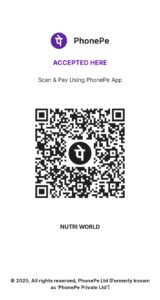Certificate Course in Nutraceuticals and Drug Nutrient Interactions (6 Months)
Organised by Nutri WORLD
The Masterclass on Nutraceuticals focuses on the importance of functional foods and dietary supplements in health and disease prevention. Participants will learn about drug-nutrient interactions to improve patient care and nutrition advice. This session aims to provide practical knowledge and strategies for those in the nutrition and healthcare fields, making it ideal for aspiring dietitians, nutritionists, and students.
Join our masterclass, learn how nutrients and drugs interact, and become a trusted expert in optimizing nutrition alongside medications.
Advantage
- Gain knowledge on bioactive compounds, functional foods, and dietary supplements for health and disease prevention.
- Learn how nutrients affect drug metabolism and reduce adverse effects.
- Improve skills in recommending dietary and supplement interventions with medications.
- Help clients optimize nutrition and medication for better health outcomes.
- Expand healthcare, pharmaceuticals, nutrition counseling, and wellness consulting career opportunities.
- Understand regulations surrounding nutraceuticals and drug-nutrient interactions.
- Combine evidence-based nutraceutical strategies with traditional medicine.
- Stand out as a specialist in the intersection of nutrition and medicine.
- Gain insights relevant to dietary supplements, pharmacology, and functional medicine research.
- Educate communities on safe supplement use and drug-nutrient synergy.
- Use skills to start a consulting business, create nutraceutical products, or partner with health brands
Course Modules
- Module 1: Introduction to Nutraceuticals and Functional Foods
- MODULE 2: NUTRIENT INTERACTIONS: FUNDAMENTALS
- MODULE 3: DRUG-NUTRIENT INTERACTIONS
- MODULE 4: NUTRIENT-NUTRIENT INTERACTIONS
- MODULE 5: FUNCTIONAL FOODS AND THEIR COMPONENT
- MODULE 6: NUTRACEUTICAL APPLICATIONS IN DISEASE PREVENTION
- MODULE 7: ASSESSMENT AND EVALUATION OF NUTRITIONAL INTERVENTION
Case studies of successful interventions - MODULE 8: CURRENT RESEARCH FINDINGS
Data presentations in tables, charts, graphs, and other figures
All data that corresponds to the central research question(s).
🔹Additional Skills You’ll Develop
📌 Bioactive Compounds & Functional Foods – Learn how these substances impact health and help prevent illness.
📌 Drug-Nutrient Interactions – Find out how nutrients can change how drugs work in the body.
📌 Personalized Supplement Plans – Get advice on safe and effective dietary choices that work alongside medications.
📌 Better Health Outcomes – Assist clients in balancing their nutrition and medications for improved results.
📌 Integrative Medicine – Blend nutritional strategies with traditional medical care.
📌 Insights into Pharmacology & Functional Medicine – Acquire useful knowledge for supplement and drug studies.
📌 Community & Client Education – Provide guidance on safe supplement use and proven nutrition methods.
📌 Career & Business Growth – Look into consulting, developing nutraceutical products, and forming brand partnerships.
📌 Nutrition & Medicine Specialization – Differentiate yourself in healthcare, pharmaceuticals, and wellness.
Step-1
Step-2
Payment Details
A/C No- 0598202100000654
IFSC Code-PUNB0059820
Name - Nutri World
Branch- Punjab National,Kakdwip
Bank - Punjab National Bank
UPI ID: 9647372176-1@okbizaxis
Facebook Link: https://www.facebook.com/20nutriworld
Google Pay :9647372176
Phone Pay: 9647372176

Important Note
AfterPayment take a Screen shot and send us so we can validate your registation, without payment proof your registation will not be activated.
FAQ
1. What are Nutraceuticals?
Nutraceuticals are bioactive compounds derived from food sources that provide health benefits beyond basic nutrition. They include dietary supplements, functional foods, and medicinally active food components that help in disease prevention and overall wellness.
2. How do Nutraceuticals differ from Pharmaceuticals?
- Nutraceuticals are derived from natural food sources and used for preventive health benefits. They are not strictly regulated as drugs.
- Pharmaceuticals are synthetic or natural compounds formulated to diagnose, treat, or cure diseases and are subject to rigorous testing and approval processes by regulatory authorities.
3. What are common examples of Nutraceuticals?
- Vitamins & Minerals (e.g., Vitamin D, Zinc, Magnesium)
- Probiotics & Prebiotics (e.g., Lactobacillus, Bifidobacterium)
- Herbal Extracts (e.g., Turmeric/Curcumin, Ashwagandha, Green Tea Extract)
- Omega-3 Fatty Acids (e.g., Fish Oil, Flaxseed Oil)
- Amino Acids & Proteins (e.g., Whey Protein, Glutamine)
4. What are the types of Drug-Nutrient Interactions?
- Pharmacokinetic Interaction: Affects drug absorption, metabolism, distribution, or excretion due to nutrients.
- Pharmacodynamic Interaction: Nutrients alter drug activity at receptor sites.
- Excretion Interaction: Nutrients impact drug clearance from the body.
- Binding Interaction: Some nutrients bind with drugs, affecting their absorption and effectiveness.
5. Can Nutraceuticals Interfere with Medications?
Yes, certain nutraceuticals can alter the effects of medications. Some examples:
- Grapefruit juice can increase drug levels (e.g., statins, blood pressure medications).
- Vitamin K can reduce the effectiveness of blood thinners like warfarin.
- Calcium & Iron supplements can reduce the absorption of antibiotics like tetracyclines and fluoroquinolones.
- St. John’s Wort can decrease the effectiveness of antidepressants and birth control pills.
6. Are Nutraceuticals Safe for Everyone?
While nutraceuticals are generally safe, they may cause adverse effects in some individuals, especially those on medications, pregnant women, or people with chronic conditions. Always consult a healthcare professional before starting any new supplement.
7. Can Nutraceuticals Replace Medications?
No, nutraceuticals are primarily used for preventive and supportive health benefits, whereas medications are formulated for treating specific diseases. Nutraceuticals can complement medications but should not be used as substitutes unless advised by a healthcare provider.
8. How Can One Choose the Right Nutraceutical Product?
- Look for products with scientific evidence and clinical research backing their claims.
- Choose supplements from reputed brands that follow regulatory standards.
- Check for third-party testing to ensure purity and potency.
- Consult a healthcare expert for personalized recommendations.



